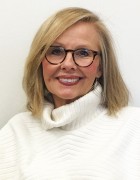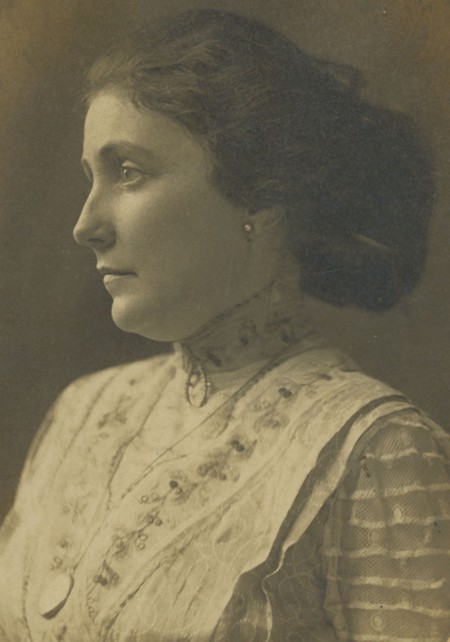Here Comes Aunt Jessie
All I knew was what I saw – Not a Memoir, Part 4

Who you got there, Aunt Jessie,” said a bald-headed man with a black mustache and a white apron hanging around his neck. “That’s my million dollars,” said Aunt Jessie, referring to me as we walked up to the counter of his shoe-repair shop. The mustached man picked me up and put me on the counter, eye level with him. He peered at me up close and asked me what that hole was in my right cheek. “A dimple,” I managed to say.
“Let me see here,” he said, reaching inside his apron pocket. He pulled out a small pocketknife, opened it close to my cheek and said, “I can get that out of there if you want.” My mute but horrified face said I didn’t want. Aunt Jessie quickly reached between me and that pocketknife, and returned me to the floor, then pulled out her ruler and pencil and started making lines on a newsprint tablet. She sold her newspaper ad, and I kept my dimple.
It was one of those days, not often enough, when Aunt Jessie, my own personal Mary Poppins, rescued me from watching snails leave silver trails on my great-grandmother Mamie’s front porch. She knew I needed a taste of the outside world, and she needed a little sales bait for her downtown rounds drumming up advertising for the Fort Bend Reporter.
Aunt Jessie, with her big floppy hat, held on by a giant pearl hat pin, was a one-woman parade with 4-year-old me in tow. Her oversized purse held a newsprint paper tablet, with a metal ruler, which stuck out. Sometimes a streak of hair would escape from under her hat, which she would slide behind her ear, where the sharpened pencil sat.
Downtown Rosenberg was typical small-town America with blocks of storefronts leading to a train depot. The Art Deco Cole Theatre towered in the center of Third Street, the actual Main Street of downtown, across from the shoe store, next to the shoe-repair shop, Etta Mae’s women’s clothing, Jack & Jill’s children’s clothes shop, the drug store, the bank, the barber shop, and such. All the business owners were white, though many nationalities. Polish, Italian, Jewish, German, and Czech accents peppered the air.
Plain old American-born transplants like my family wouldn’t have found Rosenberg if Aunt Jessie hadn’t moved there first. She was selling advertising for the Herald Coaster, the competing newspaper when the Ft. Bend Reporter came up for sale. Ikey (my great-grandfather) bought it, and moved to Rosenberg with his wife, Mamie, Aunt Jessie’s sister. Aunt Jessie joined Ikey at the Ft. Bend Reporter as Business Manager, a title not typical for a woman of that day. I bet she insisted on it.
Working women were uncommonly common in my family, for the 1950s, but none quite like Aunt Jessie. She often took her place among the downtown male proprietors to shoot the breeze. “I’m an Old Maid,” she declared one day, sitting in a circle of men. She treated it like some kind of joke she started herself, to head-off small-town gossip.
“Hello, Aunt Jessie,” said most who passed on her sidewalk rounds. I knew she was my aunt, but it seemed like she was also Rosenberg’s aunt. I watched a “colored” man in oversized trousers, held up by suspenders, step to the outside of the sidewalk, tip his hat, and say, “Good Day, Aunt Jessie,” with a hint of twinkle in his eye, like she was an old familiar friend.
Most times, the colored folks quietly stepped to the side and looked down when passing a white person. But several looked Aunt Jessie right in the eye and spoke. No one had yet explained to me how people’s skin color put them in different categories. I only knew what I saw.
Aunt Jessie’s reply to everyone was always the same. She nodded and kept walking in a no-nonsense kind of way. They say Aunt Jessie was quite a looker in her day, and turned down at least two proposals of marriage. All I knew was she could shuffle cards like a poker player. The first game she taught me was Old Maid.
No one had yet explained to me about different roles between men and women. All I knew was what I saw. Aunt Jessie didn’t care much about categories, except for me, her million dollars.
Editor's note: This is part 4 of Cindy Gabriel's "not a memoir" series. Read Part 1 here, Part 2 here, and Part 3 here.
Want more buzz like this? Sign up for our Morning Buzz emails.
To leave a comment, please log in or create an account with The Buzz Magazines, Disqus, Facebook, or Twitter. Or you may post as a guest.



